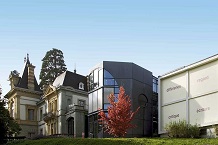articles

The Institut d'Ethnologie is housed within the Ethnographic Museum in Neuchâtel
New Directions in Agri-Environmental Governance - a workshop in Neuchâtel
On 28 and 29 May 2019, Professor Michael Winter OBE was one of the invited speakers at a workshop at the Institut d’Ethnologie in Neuchâtel, Switzerland.
The workshop focused on New Directions in Agri-Environmental Governance with participants from universities across Europe.
Increasing environmental concerns over the past decades have brought into food systems a variety of governance mechanisms that transcend traditional boundaries and produce new combinations of governance ideas, tools and actors at various scales. The workshop aimed to engage with current challenges and future directions of agri-environmental governance in a dialogue between research in social sciences and the actual practice of governance.
Four topics were identified as a framing for the discussion on agri-environmental governance: Inclusion, collaboration, reflexivity and reconfiguration. Together they open a set of useful questions to highlight and understand transformations unfolding in the agri-food system. Moreover, they arguably offer new perspectives to rethink and rejuvenate governance practices and processes oriented toward better agri-food futures.
Professor Winter’s presentation reflected on the development of thinking on agri-environmental policy in the three years since the UK referendum to leave the EU, exploring three main tensions:
- the tension between the policy desire to devolve more responsibility to farmers and the national commitment to nature recovery outcomes as set out in the 25 Year Environment Plan
- the tension between the natural capital approach, expressed as public money for public goods, and a wider rural development and agro-food agenda
- the tension within the UK state between the devolved administrations
This event was the concluding workshop of the research project “New directions in agri-environmental governance: re-assembling food, knowledge and autonomy” funded by the Swiss National Science Foundation.
For more information on the project and its outputs:
